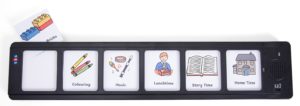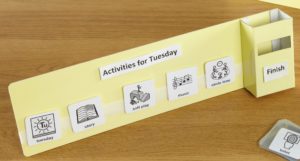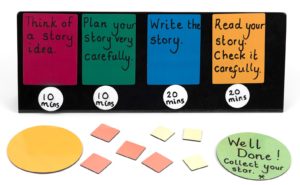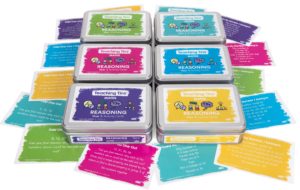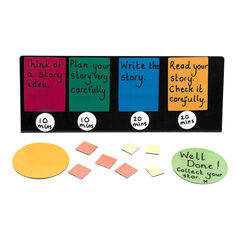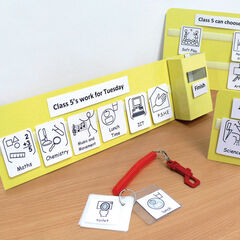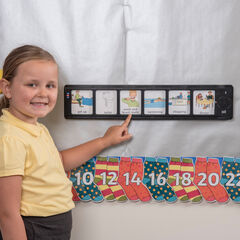For some, if you are like me, the loss of your usual routine is challenging and putting in place a new routine can really help. So, in this blog we want to offer some suggestions of how you could structure home learning and some activities you could add in to your week.
Plan your routine
Keep it simple! Set in place a structure for your day that you can then add in daily activities. There is no right or wrong routine, and you have to find one that works for you and your family.
Here are two possible approaches:
- Timetable – Set up a timetable for your day or week. You can then write in your daily activities. This could be a written timetable (click here for a free download) or a visual timetable.
//www.tts-group.co.uk/recordable-talking-wall-panel/1001420.html?cgid=Primary-SEN-Autism
- Jobs board – Plan a jobs list at the start of each day and your child can decide which order to do the jobs in, but they must all get done!
//www.tts-group.co.uk/visual-communication-starter-pack/1005477.html?cgid=Primary-SEN-Autism
The key thing for both approaches is to be clear about how many ‘jobs/activities/tasks’ you want your child to do each day.
Once you have your daily routine, you can get busy planning your days with lots of exciting activities!
What activities can we do?
Your activities do not all have to be ‘school’ activities and should include experiences that you can share and enjoy together.
Here are some things you could include:
- Physical Activity – Keeping active is really important so try to plan a daily physical activity, for example time outside, online PE video, etc. Just be sure to adhere to government guidelines if going out of your home.
- Daily Challenges – There are a lot of online resources, such as White Rose Maths, who are offering free access. Take a look and pick some activities to have a daily maths or literacy challenge. Alternatively, resources such as Teaching Tins, have loads of problem cards (with the answers on the back) that you could use one a day.
- Reading Together – Plan in time to read together or read to your child every day! It won’t necessarily be possible to get reading books from school, but reading to your child is just as valuable! You could share a book or magazine together, and some authors are doing videos of them reading books aloud.
- Specific Subject Areas – You could include activities linked to specific subjects such as science, geography, art etc. For example if your child is interested in the world, put Geography on the daily timetable and research and explore together. Our TTS Home Learning Books provide free learning activities linked to curriculum areas.
- Follow their interests – Ask your child what they would like to learn about. If they want to learn more about fish … do it! Even if you don’t know, research and learn with them.
- Life Skills – There are so many learning opportunities in daily jobs, so build those in to your timetable, such as cooking, setting the table, measuring ingredients, washing etc.
- Breaks – It is so important for you and your child to have planned breaks in the day to do something that makes you happy.
- Daily Diary – Children could write a daily diary to record their time at home. We often learn about times in the past by reading diaries, so who knows, people may be learning about this time by reading extracts from your child’s diary.
- Talents and Hobbies – Build in time for children to acquire or develop their talents and hobbies. Creative projects are great and there is a lot of research linked to brain development and creative activities. This is also really important for mental health and wellbeing.
Here is an example:
- Job 1 – Physical activity (online video)
- Break – Drawing (their choice)
- Job 2 – Maths activity (page from the TTS Home Learning Books)
- Lunch – Plan and prepare lunch together
- Job 3 – Make a musical performance!
- Job 4 – Story time together
Most importantly … Look after yourselves
Please remember this is going to be a challenging time for you and for your children so be sure to take care of yourselves. It is ok to have days that don’t go to plan! You have to do what is right for you and your family. Make sure to build in time to talk and to do things that make you happy.
Do share with us how things are going because many of the TTS team are also going through this! We know it is not easy and are with you in spirit!


